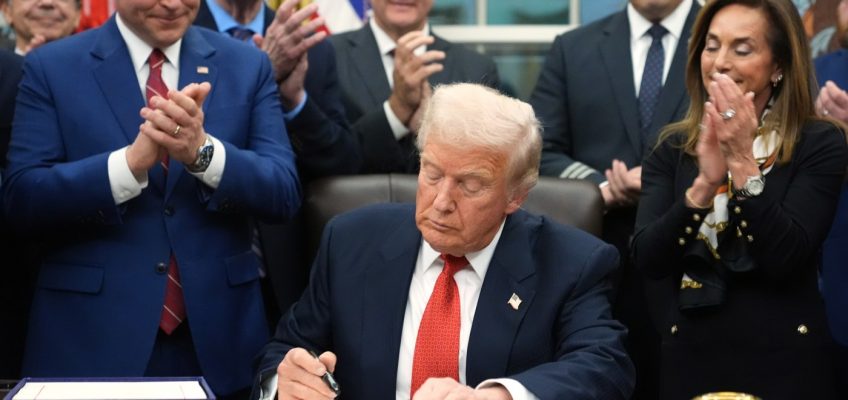WASHINGTON (AP) — President Donald Trump signed a government funding bill Wednesday night, ending a record 43-day shutdown that caused financial stress for federal workers who went without paychecks, stranded scores of travelers at airports and generated long lines at some food banks.
The shutdown magnified partisan divisions in Washington as Trump took unprecedented unilateral actions — including canceling projects and trying to fire federal workers — to pressure Democrats into relenting on their demands.
The Republican president blamed the situation on Democrats and suggested voters shouldn’t reward the party during next year’s midterm elections.
“So I just want to tell the American people, you should not forget this,” Trump said. “When we come up to midterms and other things, don’t forget what they’ve done to our country.”
The signing ceremony came just hours after the House passed the measure on a mostly party-line vote of 222-209. The Senate had already passed the measure Monday.
Democrats wanted to extend an enhanced tax credit expiring at the end of the year that lowers the cost of health coverage obtained through Affordable Care Act marketplaces. They refused to go along with a short-term spending bill that did not include that priority. But Republicans said that was a separate policy fight to be held at another time.
“We told you 43 days ago from bitter experience that government shutdowns don’t work,” said Rep. Tom Cole, the Republican chairman of the House Appropriations Committee. “They never achieve the objective that you announce. And guess what? You haven’t achieved that objective yet, and you’re not going to.”
A bitter end after a long stalemate
The frustration and pressures generated by the shutdown was reflected when lawmakers debated the spending measure on the House floor.
Republicans said Democrats sought to use the pain generated by the shutdown to prevail in a policy dispute.
“They knew it would cause pain and they did it anyway,” House Speaker Mike Johnson said.
Democrats said Republicans raced to pass tax breaks earlier this year that they say mostly will benefit the wealthy. But the bill before the House Wednesday “leaves families twisting in the wind with zero guarantee there will ever, ever be a vote to extend tax credits to help everyday people pay for their health care,” said Rep. Jim McGovern, D-Mass.
Democratic leader Hakeem Jeffries said Democrats would not give up on the subsidy extension even if the vote did not go their way.
“This fight is not over,” Jeffries said. “We’re just getting started.”
The House had not been in legislative session since Sept. 19, when it passed a short-term measure to keep the government open when the new budget year began in October. Johnson sent lawmakers home after that vote and put the onus on the Senate to act, saying House Republicans had done their job.
What’s in the bill to end the shutdown
The legislation is the result of a deal reached by eight senators who broke ranks with the Democrats after reaching the conclusion that Republicans would not bend on using a government funding to bill to extend the health care tax credits.
The compromise funds three annual spending bills and extends the rest of government funding through Jan. 30. Republicans promised to hold a vote by mid-December to extend the health care subsidies, but there is no guarantee of success.
The bill includes a reversal of the firing of federal workers by the Trump administration since the shutdown began. It also protects federal workers against further layoffs through January and guarantees they are paid once the shutdown is over. The bill for the Agriculture Department means people who rely on key food assistance programs will see those benefits funded without threat of interruption through the rest of the budget year.
The package includes $203.5 million to boost security for lawmakers and an additional $28 million for the security of Supreme Court justices.
Democrats also decried language in the bill that would give senators the opportunity to sue when a federal agency or employee searches their electronic records without notifying them, allowing for up to $500,000 in potential damages for each violation.
The language seems aimed at helping Republican senators pursue damages if their phone records were analyzed by the FBI as part of an investigation into Trump’s efforts to overturn his 2020 election loss. The provisions drew criticism from Republicans as well. Johnson said he was “very angry about it.”
“That was dropped in at the last minute, and I did not appreciate that, nor did most of the House members,” Johnson said, promising a vote on the matter as early as next week.
The biggest point of contention, though, was the fate of the expiring enhanced tax credit that makes health insurance more affordable through Affordable Care Act marketplaces.
“It’s a subsidy on top of a subsidy. Our friends added it during COVID,” Cole said. “COVID is over. They set a date certain that the subsidies would run out. They chose the date.”
Rep. Nancy Pelosi, D-Calif., said the enhanced tax credit was designed to give more people access to health care and no Republican voted for it.
“All they have done is try to eliminate access to health care in our country. The country is catching on to them,” Pelosi said.
Without the enhanced tax credit, premiums on average will more than double for millions of Americans. More than 2 million people would lose health insurance coverage altogether next year, the Congressional Budget Office projected.
Health care debate ahead
It’s unclear whether the parties will find any common ground on health care before the December vote in the Senate. Johnson has said he will not commit to bringing it up in his chamber.
Some Republicans have said they are open to extending the COVID-19 pandemic-era tax credits as premiums will soar for millions of people, but they also want new limits on who can receive the subsidies. Some argue that the tax dollars for the plans should be routed through individuals rather than go directly to insurance companies.
Sen. Susan Collins, R-Maine, chair of the Senate Appropriations Committee, said Monday that she was supportive of extending the tax credits with changes, such as new income caps. Some Democrats have signaled they could be open to that idea.
House Democrats expressed great skepticism that the Senate effort would lead to a breakthrough.
Rep. Rosa DeLauro of Connecticut, the top Democrat on the House Appropriations Committee, said Republicans have wanted to repeal the health overhaul for the past 15 years. “That’s where they’re trying to go,” she said.




